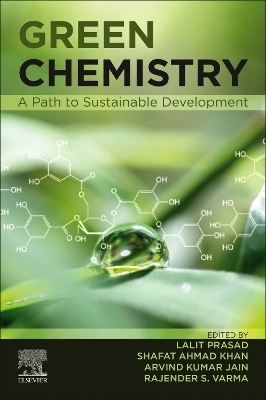
Green Chemistry
Elsevier - Health Sciences Division (Verlag)
978-0-443-21990-0 (ISBN)
- Noch nicht erschienen (ca. März 2025)
- Versandkostenfrei innerhalb Deutschlands
- Auch auf Rechnung
- Verfügbarkeit in der Filiale vor Ort prüfen
- Artikel merken
Prof. Lalit Prasad (Ph.D. from Indian Institute of Technology Delhi, New Delhi, India 2013) is presently serving in the Division of Chemistry, School of Basic Sciences, Galgotias University, Greater Noida, Uttar Pradesh, India. He has more than a decade of teaching and research experience in the area of biofuels, renewable energy, interdisciplinary science, nanotechnology, and green chemical technologies. He has experience as a researcher in various national and international sponsored research projects. He has published more than 30 research papers and book chapters, 10 Indian patents (published) and 03 edited books. He also presented his research in more than 21 national and international conferences. He has supervised a number of master’s theses in the area of biofuels, nanoscience applied chemistry and in interdisciplinary research, supervised two Ph.D. thesis, and is currently supervising five Ph.D. students. Shafat Ahmad Khan (PhD 2012, Jamia Millia Islamia, New Delhi, INDIA) has significant teaching and research experience in Organic Chemistry, Green Materials, and plant products (20+ publications, book chapters, h-index 10, 963 citations, 2 patents (filed), 1 edited book). Currently, he is working as Associate Professor in Galgotias University, Greater Noida, U.P., INDIA. Dr. Arvind Kumar Jain is a Professor of Basic and Applied Sciences and Dean of Student Welfare in IILM University, Greater Noida, India, since 2024. He completed his PhD from IIT Roorkee in 2002. He then worked in France as a CNRS post-doctoral fellow in ICMCB CNRS at Bordeaux. His areas of expertise are nanotechnology, analytical chemistry, organic synthetic chemistry. He has delivered many invited talks at national and international levels and has published a large number of research papers in national and international journals and conference proceedings, He has also guided eight Ph.D. students and has published nine patents. He has visited countries like France, Germany, and Holland for his research activities. Prof. Rajender Varma (H-Index 138, Highly Cited Res. 2016, 18, 19, 20, 21, 22) born in India (Ph.D., Delhi University 1976) has been a senior scientist at U.S. EPA since 1999. He has over 50 years of multidisciplinary research experience ranging from eco-friendly synthetic methods using microwaves, ultrasound, etc. to greener assembly of nanomaterials and sustainable appliances of magnetically retrievable nanocatalysts in benign media. He is a member of the editorial advisory board of several international journals, published over 985 papers, and awarded 17 U.S. Patents, 11 books, 31 book chapters, and 3 encyclopedia contributions with 80,009 citations.
I. Introduction
1.1 History of Green Chemistry: Remodeling from conventional approach to greener approach
1.2 Selection of solvent and auxiliary
1.3 Eutectic solvents in mining industry
1.4 Green catalyst and reagents
II. Greener approaches and methodologies for sustainability
2.1 Microwave irradiation (MWI) techniques
2.2 Ultrasonication techniques
2.3 Photo-catalysis techniques
2.4 Grinding and milling methods (mechanochemical)
2.5 Supercritical fluid extraction techniques
2.6 Biological and enzymatic approach
III. Interdisciplinary Approach of Green Chemistry
3.1 Nanoscience and nanotechnology
3.2 Sustainable energy resources
3.3 Green structure and buildings
3.4 Petroleum and oil industries
3.5 Green approach for transportation
IV By-product Value addition
4.1 Zero waste technology
4.2 CO2 Sequestration/conversion of CO2 to methanol
4.3 Conversion of waste to value added product
4.4 Green Solution for environmental sustainability
V Green chemistry: challenges, opportunities, and Future Perspective of green chemistry
5.1 Major challenges
5.2 Opportunities in different sectors
5.3 Case studies & Techno-economic analyses
5.4 Future possibility & Life cycle analysis (LCA)
| Erscheint lt. Verlag | 1.3.2025 |
|---|---|
| Verlagsort | Philadelphia |
| Sprache | englisch |
| Maße | 152 x 229 mm |
| Themenwelt | Naturwissenschaften ► Biologie ► Ökologie / Naturschutz |
| Naturwissenschaften ► Chemie | |
| Technik ► Umwelttechnik / Biotechnologie | |
| Weitere Fachgebiete ► Land- / Forstwirtschaft / Fischerei | |
| ISBN-10 | 0-443-21990-7 / 0443219907 |
| ISBN-13 | 978-0-443-21990-0 / 9780443219900 |
| Zustand | Neuware |
| Informationen gemäß Produktsicherheitsverordnung (GPSR) | |
| Haben Sie eine Frage zum Produkt? |
aus dem Bereich


